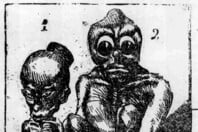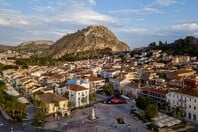Τελικα ειμαστε και μεις σαν τους Τουρκους. Προτιμουμε τις περιστασιακες εξυπναδες απο στερεες αξιες και συμπεριφορες.Πως κανουν τωρα τις προκλησεις οι Τουρκοι εναντιον της Ευρωπης για να "δικαιολογησουν" το ανοιγμα της προσφυγικης κανουλας, ετσι και μεις περιμεναμε το 2009 για να θυμηθουμε τα κατοχικα απο τη Γερμανια ( 60 χρονια μετα το τελος του ΒΠΠ ) και την ανοδο της ΧΑ και της λοιπης ευρωπαικης ακροδεξιας για να ζητησουμε τα μαρμαρα ως κινηση αντιφασισμου ( παροτι ΚΑΙ ο Χιτλερ ΚΑΙ κυριως ο Γκερινγκ - που χε φτιαξει ολοκληρο μουσειο στο Βερολινο με κλεμενα ) λατρευαν την Αρχαια Ελλαδα. Οχι οτι εχει αδικο η υπουργος, ευχομαι ομως οτι οι βρετανοι που ειναι σχετικα καλοι γνωστες της ιστοριας να μη το παρουνε στραβα και την διαολοστειλουνε οπως εκανε ο Μπορις Τζονσον στον Κλουνε'ι'.Επιπροσθετα, εχουμε επιχειρηματα και μαλιστα δυνατα. Να μερικα που εχω μαζεψει και βρει ( οπως το τελευταιο ) σε βαθος δεκαετιας :1 ) Elgin never presented a single document to the British Parliamentary committee back in 1816, to verify he had permission to remove the Parthenon stones. He said to the committee that the Ottoman "firman", the document given to him, was lost. The only document the committee saw, was an English translation of an Italian translation of an original Ottoman "firman" by Elgin's proxy, the Rev. Philip Hunt. Hunt's original Ottoman firman was also lost... Hunt manipulated the English translation by adding his name instead of the initials N.N, the Italian translation had in the first sentence of its second paragraph. In addition, Hunt, added a signature while the Italian version had no signatures at all. In the Italian translation which corresponds to the second firman, the one Hunt used, the language is very ambiguous. It talks about removing " qualche pezzi di pietra " which only occasionally translates as "some" or "few" because the first firman clearly states that the artists involved should only do drawings, walk on the hill, view the artefacts or excavate if they find it necessary, in search of inscriptions among the rubbish. It is also not clear what is the role of the Italian Giovanni Lusieri on the Italian translation, the coordinator of Elgin's marble collection in Athens and the man who actually removed the stones from the Parthenon for the British Ambassador. What is evident without a doubt is the lack of any clear authorization to remove marble statuary from the Parthenon edifice. The committee saw only the English translation never the Italian one ( the changes Reverend Hunt made on the text, in other words ) and with that paper printed at the apendix of its 1816 report and after a narrow vote, the Parliament decided to buy from Elgin the Parthenon marbles and hand them to the British Museum ! 2 ) What we do have from Elgin is his correspondence with Lusieri. And is very troubling. " I have, my Lord, the pleasure of announcing to you the possession of the eighth metope, that one where there is the centaur carrying off the woman. This piece has caused much trouble in all respects and I have been obliged to be a little barbarous" wrote the Italian to Elgin. In another letter he hoped the barbarisms he had commited to be forgotten. On July 10, 1801, Elgin wrote to Lusieri " Besides, you have now the permission to dig, and there a great field is opened for medals, and for the remains both of sculpture and architecture." If Elgin had permission to go after the marbles, he would have celebrated that power, not the permission to dig or excavate that he describes. 3 ) It is not within the power of the British Museum, or indeed the cabinet alone, to return the stones to Greece. Only an act of Parliament can reverse the government's acquisition. What most people don't know is that, in fact, right after The British Museum acquired the marbles, a small group of MPs felt the marbles should be held in a trust until their return was demanded by the city of Athens. In addition, back in the year 2000, the British weekly "Economist" contacted a poll on the subject and found nearly 85% of the Labour and Liberal Democrat MPs would return the marbles, if there were a free vote in the House of Commons. 4 ) During the first 18 months, Elgin paid the military governor of the Acropolis a sum amounting to 35 times his official annual salary in return for being allowed to "stretch" the terms of the firman... The bribery ammounted to a quarter of the costs of removing the antiquities from Athens, according to the British historian William St Clair. ( "Lord Elgin and the Marbles : The Controversial History of the Parthenon Sculptures"). 5 ) Research into the chemistry of antiquities, conservation and restoration is probably more advanced in Greece than anywhere else. The work of an elderly chemistry professor, Thedore Skoulikides, on reversing the worst effects of pollution on marble surfaces, and by Manolis Korres on the technology of constructing ancient buildings, are considered the finest in the world. One curator at the British Museum insists that, "Because of the Greeks' work we know more about the marbles than we have ever known." ( Economist, March 21, 2000/) 6 ) Back in 1999, the New York Times reported news of a symposium that took place in London, a symposium on the state of the Parthenon stones in the British Museum. 200 archaelogists, curators and cultural officials clashed over the way the stones were treated over the years. But in one point , Ian Jenkins, the Museum's assistant keeper of the Department of Greek and Roman antiquities, confirmed that in 1937, Museum cleaners had used steel wool, carborundum, hammers and copper chisels to "skin the Marbles" original stained patina and that the Museum had conducted an "illegal and improper cover-up" of the flawed work to British political and religious authorities. He called it a "scandal". (The New York Times - Dec 2, 1999/ A4 ) 7 ) The 1801 British defeat of the French in Egypt, which was then part of the Ottoman Empire, gave Elgin the authority to ask the Ottomans for permission to remove the statues from the Parthenon. The Ottomans wanted to get control of Egypt once again. That is why they succumbed so easily to the wishes of the British Ambassador. 8 ) Να τελειωσω με ενα επιχειρημα που εδωσα προσωπικα στον αρχαιολογο Παντερμαλη τον προεδρο του Μουσειου Ακροπολης. Ειναι επιχειρημα απαντηση στον περιβοητο Νιλ Μακ Γκρεγκορ του ΒΜ που ειχε επιχειρηματολογησει οτι τα γλυπτα πρεπει να μεινουν στο Λονδινο γιατι ειναι οικουμενικα, οπως ειναι ο Μπετοβεν κι ο Σεξπιρ. Οταν ο γνωστος αμερικανος Π. Τ. Μπαρνουμ, πηγε να αγορασει το σπιτι γεννησης του Σεξπιρ το 1847 στο Στρατφορντ, αμεσως οι Βρετανοι εκαναν μια εκστρατεια ( εκστρατεια Ντικενς - Μακ Ρ'ε'ιντι με λαικη συνδρομη ) και του κοψαν το βηχα. Το καναν αυτο γιατι νοιωσαν οτι καποιος μη-βρετανος ηθελε να κανει ιδιοκτησια του κομματι της ιστοριας τους, κατι το οποιο καταρριπτει το επιχειρημα του Νιλ Μακ Γκρεγκορ και δικαιωνει οσους θελουν να επανενωθουν οι μετωπες.























